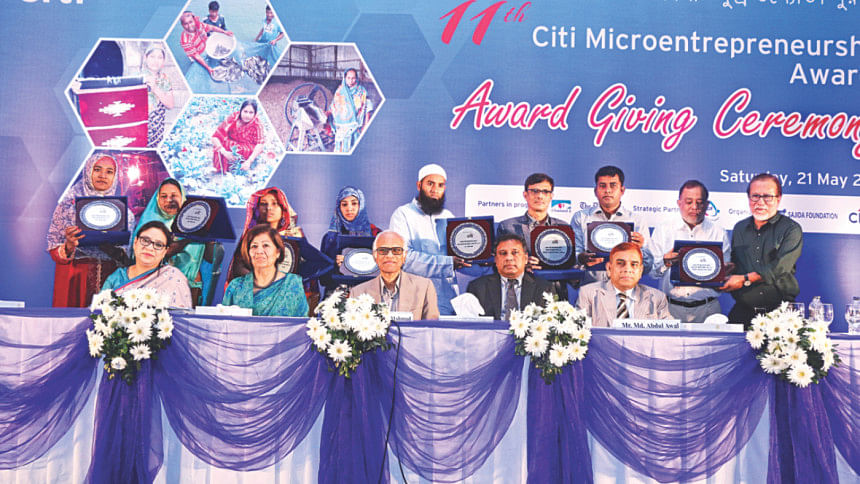Small businesses honoured

Citi Foundation, the philanthropic arm of Citigroup, yesterday awarded three microentrepreneurs and two microfinance institutions for their contributions to the economy.
Wahiduddin Mahmud and Rokia A Rahman, former advisers to the caretaker government, handed the 11th Citi Microentrepreneurship Awards, at a programme at Bangabandhu International Conference Centre in Dhaka.
Israt Jahan from Meherpur won the best microentrepreneur of the year award for establishing a successful fish feed production firm and for producing fish.
A postgraduate in botany, Jahan in 2002 found that the two ponds her husband used for fish farming were not enough to meet the expenses of her large family. She then started producing fish feed.
She now cultivates 15 tonnes of fish a month in 15 ponds. Besides, her feed is bought by pond owners in the neighbouring areas. She has employed 100 people, directly and indirectly. She earns Tk 2 lakh a month. “There was no way but to start the business to break the cycle of poverty,” Jahan said at the award ceremony.
Ophina Begum from Thakurgaon was honoured as the best woman microentrepreneur of the year for growing a business that produces organic fertiliser from animal wastes and bones.
When Ophina started the venture in 1998, she used to produce 40 sacks of organic fertiliser. Now she produces 1,000 sacks of fertiliser.
Now 40 people work for her, a majority of them are rural women. “Now I want to export my products,” said Ophina, mother of three children.
Shohel Miaji from Chandpur was awarded as the best microentrepreneur of the year in agriculture for cultivating fish in enclosures in the Dakatia river.
Miaji tried his luck as a tailor at home and a migrant worker. Later, he started producing fish in four enclosures in 2007, and it worked quickly.
Now he produces fish in 42 enclosures tied together, producing 26 tonnes of fish a year. Seeing his success, 12 people have already joined the trade.
“This type of efforts can help Bangladesh boost fish production,” said Wahiduddin Mahmud.
Community Development Centre (CODEC), which works for the wellbeing of the communities living in the coastal and riverine areas, was honoured with the most innovative microfinance institution of the year award.
Since its inception in 1985, CODEC has reached out to 600,000 families.
It also works for the fishermen, helping them with boats, nets and marketing of their produce. As a result, 95,000 fishermen have been able to escape the clutches of loan sharks. CODEC has also set up 500 community schools in 11 districts.
The Integrated Development Foundation, a non-profit, non-political and a non-government organisation, was chosen for the best microfinance institution of the year award.
It works for the extreme poor people of hilly, remote and backward areas in the Chittagong Hill Tracts.
The award winners got Tk 4.5 lakh as prize money and certificates.
Mahmud, chairperson of the awards' advisory council, said Bangladesh has been able to sustain a stable economic growth amid global turmoil. In this case, microentre-preneurs have contributed significantly, he said.
He said, although there have been a lot of talks in the run-up to the budget, none of the talks focus on the investment climate of microentrepreneurs.
Of the two crore active microcredit members across the country, around 8 percent or 16 lakh have become micro-enterprises, according to experts.
Rokia A Rahman, a noted entrepreneur, who presided over the ceremony, said they become inspired after seeing the courage and hearing the stories of building a business against all odds.
Zahida Fizza Kabir, executive director of Sajida Foundation, said microentrepreneurs have contributed to the development of the country.
Abdul Awal, executive director of Credit Development Forum, said the government and the Bangladesh Bank should continue efforts so that microentrepreneurs do not lose enthusiasm.
Launched in 2005 and now covering more than 30 countries, the Citi Microentrepreneurship Awards programme highlights the contributions of microentrepreneurs and microfinance institutions to their local economies, said Moinul Huq, acting country officer of Citi Bangladesh.
Through the programme, the Citi Foundation has invested more than $12 million in microfinance networks and microfinance institutions to convene thousands of key stakeholders that influence sector-wide policy and regulation and encourage innovation around the world.
Citi, a leading global bank, has about 200 million customer accounts and does business in more than 160 countries and jurisdictions.
The Citi Microentrepreneurship Awards is being supported by the Citi Foundation, and implemented in the country by Citibank NA Bangladesh in association with Sajida Foundation, Credit and Development Forum, The Daily Star and Channel i.

 For all latest news, follow The Daily Star's Google News channel.
For all latest news, follow The Daily Star's Google News channel. 



Comments